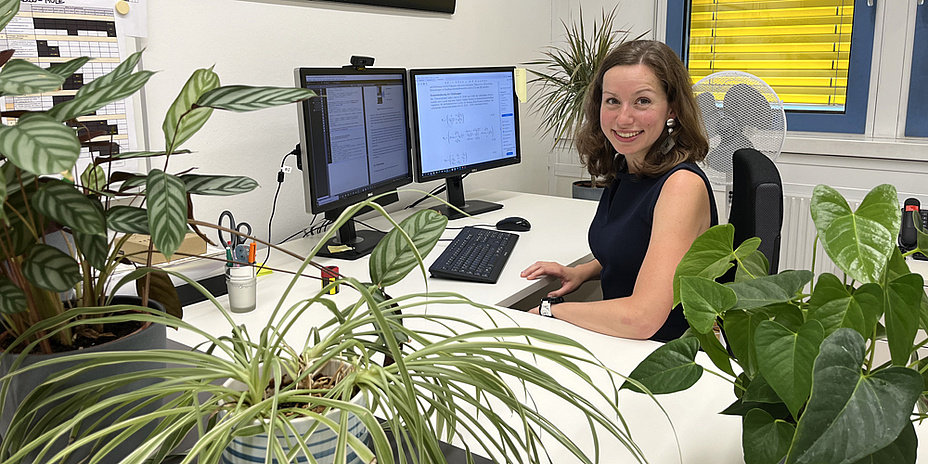Compost turner provides fertile ground for doctorate

A compost turner – does that mean anything to you? No? Well don’t worry, you’re probably not the only one! But when Eva Reitbauer starts talking about this particular piece of equipment, you’ll find it very interesting. She knew next to nothing about the composting process to begin with, but now, after several years of work, the TU Graz researcher is not only an expert in navigating autonomous agricultural machinery, she’s also fascinated by it. Eva and her colleagues are responsible for enabling compost turners to move independently between compost heaps – sometimes also referred to as clamps – and turn the composting material.
Compost turners play a vital role in commercial composting. The raw material has to be stored at the right temperature, with the right level of humidity and ventilation, so that the compost ultimately helps to create nutrient-rich soil. And it has to be turned regularly, too. At compost yards, most of the work is done by turners – these large machines move extremely slowly between the clamps, at between 50m and 300m per hour, and mix the compost. Nowadays, the machines are steered by people – but it’s tough, monotonous work, and smelly, too. Working in collaboration with the Institute of Logistics Engineering, Pusch & Schinnerl GmbH, Sonnenerde GmbH and the University Magdeburg, the Institute of Geodesy has been performing research into autonomous compost turners designed to make the job easier. The TU Graz researchers succeeded in making a turner move autonomously between compost heaps at the end of the ANTON project, as Eva Reitbauer explains: “Last autumn we carried out a series of trials at the compost yard and the turner worked without a hitch. It even managed to stay on track when the operator positioned it completely askew at the end of the clamp.” Eva’s main task is ensuring inch-perfect positioning of the device, which is essential for navigation. To do this, she uses global navigation satellite systems (GNSS), an inertial measurement unit, incremental encoders and a stereo camera. To make the positioning fail-safe, she combines the data from all sensors and uses special motion models that can be used to further calculate the position in the event of a sensor failure.
Play video
This is how the autonomous compost turner drives.
From ANTON to ANDREA
Known as ANDREA, the follow-up project aims to find a way to further automatize the workflow. For example, to let the turner rotate at the end of a compost heap before moving on to the next one. Another goal is to simplify the process of documenting data by the operator: “At every compost yard, the composting process needs to be precisely documented by measuring the temperature regularly at different points. Our compost turner is moving through the material anyway, so we want to fit it with sensors that can take these measurements automatically.”
Diplomacy gives way to navigation
Eva Reitbauer is currently an assistant professor at TU Graz. After attending the GIBS bilingual grammar school in Graz, she thought long and hard before finally deciding against pursuing a career in the diplomatic service or law, a path which many GIBS graduates follow. Instead, she wanted to study technology, and was fascinated by geodesy because of the subject’s links to space – a topic that had interested her since she was a child.
For Eva, no two working days are the same, and she splits her time between teaching, research and admin: “Every day is different. I prepare for my courses, correct papers, or I’m up to my eyeballs in books and articles searching for new ideas and approaches. Or I might be buried under a pile of notes, trying to make some deductions or pinpoint errors in my programming.”
The 28-year-old researcher aims to hand in her dissertation in summer and plans to take the oral exam during autumn. Her dissertation focuses on the combination of different types of navigation sensor, and how they can be integrated most effectively to enable agricultural machinery to move around autonomously. This topic was also at the heart of the ANTON and ANDREA research projects. “It’s the combination of mathematics and practical application behind everything that fascinates me the most. I often put together pages and pages of inferences and to see, that the machines can actually put them into practice, is quite fascinating,” she explains with a grin. Even though she freely admits that she didn’t have a clue what a compost turner was before the project. “During the project I had to study the machinery in great detail. One thing is that it’s chain-driven – a completely different form of motion compared to a car.” And as she adds with a chuckle: “Of course, I picked up a few tips for my own garden as well. So now I only put really good compost in my soil!”
This research area is anchored in the Field of Expertise “Information, Communication & Computing”, one of five strategic foci of TU Graz.
You can find more research news on Planet research. Monthly updates from the world of science at Graz University of Technology are available via the research newsletter TU Graz research monthly.
Kontakt
Eva Maria REITBAUER
Dipl.-Ing. BSc
Institute of Geodesy
Steyrergasse 30/II
8010 Graz
Phone: +43 316 873 6833
eva.reitbauer@tugraz.at



